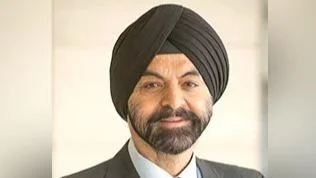Le Dong Phuong, a seasoned farmer in Viet Nam's Mekong Delta, adjusts the sluice gate to allow water into her parched field. "Rice thrives on water," she states, her voice echoing the wisdom of countless harvests.
Phuong and other farmers across the Mekong Delta are now using water more judiciously as part of an International Development Association (IDA) financed project. The initiative aims to support sustainable rice production, reduce methane emissions, and enhance yields, grain quality, and farmers' profitability.
Historically, Vietnamese farmers have excessively used water for their rice fields - a practice that is no longer feasible due to climate change impacts on the Mekong Delta and reduced water availability. This overuse also has hidden environmental costs as it increases methane emissions – a potent greenhouse gas that traps heat in the atmosphere 80 times more effectively than carbon dioxide over a 20-year span. Rice farming contributes to three-quarters of Viet Nam's agricultural sector's annual methane emissions.
Furthermore, reliance on nonorganic fertilizers and pesticides has raised costs, compromised food safety, and strained the environment. Climate change amplifies these challenges by subtly altering once-fertile landscapes.
However, a green transformation is underway. Farmers in the Mekong Delta are beginning to adopt "high-quality, low-emission rice", an innovative approach that boosts profits while reducing emissions and environmental pollution caused by excessive use of seeds, fertilizers, and pesticides.
The Viet Nam Sustainable Agriculture Transformation Project (VnSAT) equipped hundreds of thousands of farmers like Phuong with knowledge and resources to adopt sustainable rice farming techniques from 2015-2022. These methods focused on improving water management and reducing seeding rates and applications of agrochemicals without sacrificing yields.
Initially skeptical about these new methods, Phuong recalls how multiple visits to demonstration farms eventually convinced her. "Seeing is believing," she reflected. "You really can grow the same amount of rice with fewer seeds."
Cao Thang Binh, the project’s team leader for the World Bank, explained that farmers need to see a clear economic benefit from adopting these sustainable practices. This means securing customers willing to pay more for higher quality rice.
The project has acted as a convener, connecting farmers with agribusiness firms and streamlining the previously fragmented supply chain. This intervention proved particularly beneficial for farmers growing high-quality rice, notably the ST25 fragrant rice variety, named the world’s best rice at The Rice Trader World Rice Conference in 2023.
Nguyen Thi Tuyet Ngoc, Director of “My Field”, a program launched by Viet Nam’s Ministry of Agriculture and Rural Development to market high-quality rice produced under the VnSAT, said they are excited to be part of the green agriculture transformation.
The International Finance Corporation (IFC) has been working with agribusiness players in Viet Nam such as Tan Long Group to implement sustainable farming practices. These efforts have resulted in lower production costs by up to 15 percent and reduced post-harvest loss rate by half.
A mobile application introduced to Mekong Delta's rice farmers guides them on sustainable farming through localized agronomical notifications. Truong Sy Ba, Chairman of Tan Long Group, said they aim to develop a sustainable rice production strategy and supply up to five million tons of green, safe, and high-quality rice within the next ten years.
In seven years since the project started in 2015, Mekong Delta farmers working across 185,000 hectares of land reduced their use of inputs by up to 50% and increased their earnings by 30% on average. Their sustainable farming practices have helped cut approximately 1.5 million tons of CO2e emissions each year.
The Vietnamese government has pledged to scale up this successful project with potential new World Bank financial support. The goal is to cover an additional 1 million hectares and reduce greenhouse gas emission by up to 10 million tons of CO2e by 2030 in the Mekong Delta.
Phuong notices growing interest from her neighbors. "People are realizing what yields better income," she said. "They've been asking about our way of growing rice and will likely join next time."

